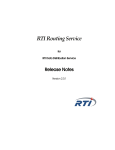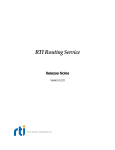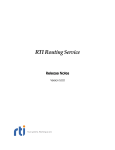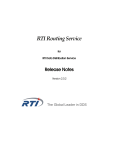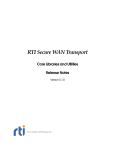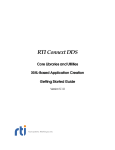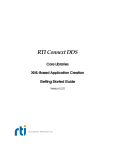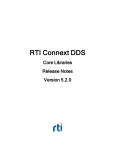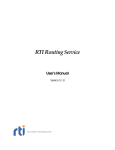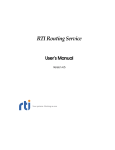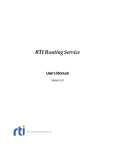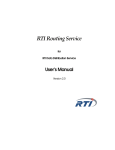Download Release Notes - Community RTI Connext Users
Transcript
RTI Routing Service Release Notes Version 5.1.0 © 2013 Real-Time Innovations, Inc. All rights reserved. Printed in U.S.A. First printing. December 2013. Trademarks Real-Time Innovations, RTI, and Connext are trademarks or registered trademarks of Real-Time Innovations, Inc. All other trademarks used in this document are the property of their respective owners. Copy and Use Restrictions No part of this publication may be reproduced, stored in a retrieval system, or transmitted in any form (including electronic, mechanical, photocopy, and facsimile) without the prior written permission of RealTime Innovations, Inc. The software described in this document is furnished under and subject to the RTI software license agreement. The software may be used or copied only under the terms of the license agreement. Technical Support Real-Time Innovations, Inc. 232 E. Java Drive Sunnyvale, CA 94089 Phone: (408) 990-7444 Email: [email protected] Website: https://support.rti.com/ Contents 1 Supported Platforms ....................................................................................................................................1 2 Supported Languages ..................................................................................................................................2 3 Compatibility ................................................................................................................................................2 3.1 Connext Compatibility ...................................................................................................................2 3.2 Command-Line Options Compatibility .......................................................................................3 3.3 XML Compatibility .........................................................................................................................3 3.4 Transformation API.........................................................................................................................4 4 What’s New in 5.1.0 ......................................................................................................................................6 4.1 New Platforms .................................................................................................................................6 4.2 Filter Propagation............................................................................................................................6 4.3 Ability to Override Name of Participants Created by Routing Service ..................................6 5 What’s Fixed in 5.1.0 .....................................................................................................................................7 5.1 Possible Crash During Transformation if Monitoring Enabled................................................7 5.2 Possible Segmentation Fault upon Discovery of Types with Bit Fields ..................................7 5.3 Possible Crash when Updating Any Routing Service Entity with Invalid Configuration when Disabled .......................................................................................................7 5.4 Possible Crash after Updating Disabled DomainRoute ............................................................7 5.5 Routing Service Entered Infinite Loop upon XML DTD Validation Error During Start Up .............................................................................................................................................7 5.6 Deserialization Errors when Using Topic Route if Input Type Contained Unions or Sequence Members..........................................................................................................................7 5.7 Deserialization Errors if Topic Route’s Input Type was a Valuetype ......................................7 5.8 Remote Update Failed when Sending Well-Formed Service Configuration with Default Name .................................................................................................................................................8 5.9 Incorrect Handling of Samples if Received Type was Valuetype Marked as Extensible......8 5.10 When Saving XML Configuration, New Filter Level not Saved if Modified Remotely .......8 5.11 XML Save Functionality did not Replace Predefined Entities by Their Names ....................8 5.12 Failure to Close Files with XML Snippet used to Update Routing Service ............................9 5.13 ‘Get Key Value’ Error and Failure to Propagate Dispose Message for Sample in Some Cases..................................................................................................................................................9 5.14 Delay in Publishing Entity Data Topic for Routes Created from Auto Routes ......................9 5.15 Host Free Swap Memory and Total Swap Memory Reported as Zero —Windows Systems Only..............................................................................................................9 5.16 Failure to Enable Remote Administration when Loading Java 7 Adapters ...........................9 5.17 Incorrect Monitoring Data Reported when Statistics Sampling Period Equal or Longer than Publication Period ..................................................................................................................9 iii 5.18 5.19 5.20 5.21 Routing Service did not notify StreamWriters of Disposed or Unregistered DDS Instances .........................................................................................................................................10 Parser did not Report Error if <domain_id> not in <administration> Tag ..........................10 Minor Errors in Default Configuration File, RTI_ROUTING_SERVICE.xml .......................10 Inconsistent QoS Settings for Remote Administration and Monitoring Entities if Loaded QoS Profile was Marked is_default_qos=true ............................................................10 6 Known Issues ..............................................................................................................................................11 6.1 Limitations in Adapter API .........................................................................................................11 6.2 Sequences of Transformations in a Route not Supported........................................................11 6.3 Assignment Data Transformation only Supports Assignment of Primitive Fields not Part of Arrays or Sequences ..................................................................................................11 6.4 Topics of Data Types with Bit Fields are not Supported..........................................................11 7 Available Documentation .........................................................................................................................11 iv Release Notes 1 Supported Platforms RTI® Routing Service is supported on these platforms: Table 1.0 Supported Platforms Platform INTEGRITY® Linux® Windows® Operating System Architecture INTEGRITY 10.0.2 pentiumInty10.0.2.pcx861 CentOS 5.4, 5.5 (2.6 kernel) i86Linux2.6gcc4.1.2 x64Linux2.6gcc4.1.2 CentOS 6.0, 6.2 - 6.4 i86Linux2.6gcc4.4.5 x64Linux2.6gcc4.4.5 Raspbian Wheezy 7.0 armv6vfphLinux3.xgcc4.7.2 Red Hat® Enterprise Linux 5.0 i86Linux2.6gcc4.1.1 x64Linux2.6gcc4.1.1 Red Hat Enterprise Linux 5.1, 5.2, 5.4, 5.5 i86Linux2.6gcc4.1.2 x64Linux2.6gcc4.1.2 Red Hat Enterprise Linux 6.0 - 6.4 i86Linux2.6gcc4.4.5 x64Linux2.6gcc4.4.5 Ubuntu® Server 12.04 LTS (2.6 kernel) i86Linux3.xgcc4.6.3 x64Linux3.xgcc4.6.3 Windows 7 Windows 8 Windows Server® 2008 R2 Windows Server 2012 R2 Windows 2003 Windows Vista® Windows XP Professional i86Win32VS2005 i86Win32VS2008 i86Win32VS2010 i86Win32VS2012 x64Win64VS2005 x64Win64VS2008 x64Win64VS2010 x64Win64VS2012 1. Does not include TCP/IPv4 transport plugin; implemented as a static library Routing Service is also supported on the platforms listed in Table 1.1; these are target platforms for which RTI offers custom support. If you are interested in these platforms, please contact your local RTI representative or email [email protected]. 1 Supported Languages Table 1.1 Custom Supported Platforms Operating System NI Linux 2 CPU ARMv7 Compiler gcc 4.4.1 RTI Architecture Abbreviation armv7AngstromLinux3.2gcc4.4.1.cortex-a9 Supported Languages ❏ The transformation plugin API is only available in C. ❏ The adapter plugin API is available in C and Java. 3 Compatibility 3.1 Connext Compatibility Routing Service can be used to forward and transform data between applications built with RTI Connext™, as well as RTI Data Distribution Service 4.5[b-e], 4.4d, 4.3e, and 4.2e except as noted below. ❏ Routing Service is not compatible with applications built with RTI Data Distribution Service 4.5e and earlier releases when communicating over shared memory. For more information, please see the Transport Compatibility section in the RTI Core Libraries and Utilities Release Notes.1 ❏ In Connext 5.1.0, the default message_size_max for the UDPv4, UDPv6, TCP, Secure WAN, and shared-memory transports changed to provide better out-of-the-box performance. Routing Service 5.1.0 also uses the new value for message_size_max. Consequently, Routing Service 5.1.0 is not out-of-the-box compatible with applications running older versions of Connext or RTI Data Distribution Service. Please see the RTI Core Libraries and Utiltities Release Notes for instructions on how to resolve this compatibility issue with older Connext and RTI Data Distribution Service applications. ❏ The types of the remote administration and monitoring topics in 5.1.0 are not compatible with 5.0.0. Therefore: • The 5.0.0 RTI Routing Service shell, RTI Admin Console 5.0.0, and RTI Connext 5.0.0 user applications performing monitoring/administration are not compatible with RTI Routing Service 5.1.0. • The 5.1.0 RTI Routing Service shell, RTI Admin Console 5.1.0, and RTI Connext 5.1.0 user applications performing monitoring/administration are not compatible with RTI Routing Service 5.0.0. 3.1.1 RTI Data Distribution Service 4.2e Compatibility If the applications’ data types contain 8-byte or larger primitive types (double, long long, unsigned long long or long double), Routing Service will have to be run with the command line option -use42eAlignment in order to be compatible with RTI Data Distribution Service 4.2e. If the applications use large data, Routing Service must be configured with the following properties set to 1 in order to be compatible with RTI Data Distribution Service 4.2e: 1. See <Connext installation directory>/ndds.<version>/doc/pdf/RTI_CoreLibrariesAndUtilities_ReleaseNotes.pdf. 2 Compatibility ❏ dds.data_writer.protocol.use_43_large_data_format ❏ dds.data_reader.protocol.use_43_large_data_format 3.1.2 RTI Data Distribution Service 4.3e Compatibility If the applications use large data, Routing Service must be configured with the following properties set to 1 in order to be compatible with RTI Data Distribution Service 4.3e. ❏ dds.data_writer.protocol.use_43_large_data_format ❏ dds.data_reader.protocol.use_43_large_data_format 3.2 Command-Line Options Compatibility Starting with Routing Service 1.1.0, the command-line parameter -srvName has been replaced with -cfgName (to select a configuration) and -appName (to name the service execution). In previous Routing Service versions, the -srvName parameter was not required. However, in this version the equivalent parameter -cfgName is required. Also starting with Routing Service 1.1.0, the allowed values for the -verbosity command-line option changed. The new -verbosity option coalesces the old -verbosity and -ddsVerbosity options into a single parameter. For additional information about command-line options, see Chapter 3 in the Routing Service Getting Started Guide. 3.3 XML Compatibility ❏ Starting with Routing Service 1.1.0, the attribute “name” in the <routing_service> tag is now required. Old XML files without the name attribute will not be parsed by Routing Service 1.1.0 and higher. ❏ Starting with Routing Service 2.0.0, the way to register and configure transformations in the configuration file has changed: • The tag <transformation_class_library> <transformation_library> has been replaced with • The tag <transformation_class> has been replaced with <transformation_plugin>. • The content of these tags has also changed. With the new configuration there is only a single entry point to the library. For example: <transformation_library name="MyTransfLib"> <transformation_plugin name="MyTransfPlugin"> <dll>mytransformation</dll> <create_function> <!-- Entry point --> MyTransfPlugin_create </create_function> </transformation_plugin> </transformation_library> • The configuration of a transformation within <route> is done using properties instead of the <expression> and <parameter> tags. For example: <transformation plugin_name="TransformationLib::Assignment"> <property> <value> <element> <name>X</name> <value>Y</value> </element> 3 Compatibility <element> <name>Y</name> <value>X</value> </element> </value> </property> </transformation> • The configuration of the assignment transformation distributed with Routing Service is now done with properties. For example: Before 2.0.0: <transformation className="TransformationLib::Assignment"> <expression></expression> <parameter>position.x=position.y</parameter> <parameter>x=10</parameter> </transformation> In 2.0.0 and higher: <transformation plugin_name="TransformationLib::Assignment"> <property> <value> <element> <name>position.x</name> <value>position.y</name> </element> <element> <name>x</name> <value>10</name> </element> </value> </property> </transformation> 3.4 Transformation API The transformation API of Routing Service 2.0.1 and higher is not compatible with the API of previous releases (2.0.0 and lower). The new API follows the same model as the adapter API which introduced the concept of a Plugin as a C structure that contains all the function pointers that implement the interface. The registration of a transformation plugin with the new model requires a single entry-point to the shared library; the entry-point is a function that creates the Plugin structure which contains the implementation. For example: <transformation_library name="MyTransfLib"> <transformation_plugin name="MyTransfPlugin"> <dll>mytransformation</dll> <create_function> <!-- Entry point --> MyTransfPlugin_create </create_function> </transformation_plugin> </transformation_library> The following table shows how deprecated functions map to the new API. 4 Compatibility 2.0.0 API (rti_routingservice.h) RTITransformationClass_ loadFnc() RTITransformationClass_ unloadFnc() RTITransformationClass_ createFnc() RTITransformationClass_ deleteFnc() RTITransformationClass_ modifyFnc() RTITransformationClass_ transformFnc() (none) 2.0.1 and Higher API (routingservice_transformation.h) RTI_RoutingServiceTransformation Plugin_CreateFcn() Comments This is the entry-point function. Function declaration: RTI_RoutingServiceTransformation Plugin_DeleteFcn() Member in Plugin struct: transformation_plugin_delete Function declaration: RTI_RoutingServiceTransformation Plugin_CreateTransformationFcn() Member in Plugin struct: transformation_plugin_create_ transformation Function declaration: RTI_RoutingServiceTransformation Plugin_DeleteTransformationFcn() Member in Plugin struct: transformation_plugin_delete_ transformation Function declaration: RTI_RoutingServiceTransformation_ UpdateFcn() Member in Plugin struct: transformation_update Function declaration: RTI_RoutingServiceTransformation_ TransformFcn() Member in Plugin struct: transformation_transform Function declaration: RTI_RoutingServiceTransformation_ ReturnLoanFcn() Member in Plugin structure: transformation_return_loan In the new API, the transform function accept multiple samples. In addition, the output samples must be created by the transformation instead of being passed in by Routing Service. This function is used to return the loan on the samples returned by the transform function. 5 What’s New in 5.1.0 4 What’s New in 5.1.0 4.1 New Platforms This release adds support for the following platforms: ❏ ❏ ❏ ❏ ❏ ❏ 4.2 CentOS 6.2 - 6.4 Raspbian Wheezy 7.0 Red Hat Enterprise Linux 6.2 - 6.4 Ubuntu Server 12.04 LTS (2.6 kernel) Windows 8 Windows Server 2012 R2 Filter Propagation This release enables support for propagation of the filter information from DataReaders using a ContentFilteredTopic. This feature can be enabled by using the tag <filter_propagation> within <topic_route>. See Section 2.4.6 and Chapter 9 in the RTI Routing Service User's Manual. 4.3 Ability to Override Name of Participants Created by Routing Service When Routing Service creates a DomainParticipant, it uses a specific format for its name (which gets propagated on the wire):RTI Routing Service: [service name].[domain route name]#[1|2], where [service name].[domain route name] are the names of the service and domain route that contain that participant, followed by 1 or 2, indicating if it is the first or second participant in that domain route. In previous releases, it was not possible to change this name. Now, when specified, Routing Service will use the name specified through the DomainParticipant QoS. For example, when using the following configuration, Routing Service will create a participant named MyParticipant: <routing_service name="MyService"> <domain_route name="MyDomainRoute"> <participant_1> ... <participant_qos> <participant_name><name>MyParticipant</name></participant_name> </participant_qos> </participant_1> ... </domain_route> ... </routing_service> If you omit the line, <participant_name><name>MyParticipant</name></participant_name>, Routing Service will use the default name as described above: RTI Routing Service: MyService.MyDomainRoute#1. The DomainParticipants created for remote administration and monitoring will also honor userspecified names. 6 What’s Fixed in 5.1.0 5 What’s Fixed in 5.1.0 5.1 Possible Crash During Transformation if Monitoring Enabled Routing Service may have crashed while gathering statistics for samples that go through a transformation. This problem only occurred if monitoring was enabled and a transformation plug-in released a sample in its return_loan() function. [RTI Issue ID ROUTING-139] 5.2 Possible Segmentation Fault upon Discovery of Types with Bit Fields If Routing Service discovered a DataReader or DataWriter whose type contained bit fields, it may have issued a segmentation fault. Routing Service does not support bit fields (see Section 6.4), but now it will handle the error appropriately. [RTI Issue ID ROUTING-162] 5.3 Possible Crash when Updating Any Routing Service Entity with Invalid Configuration when Disabled Routing Service may have crashed if an update operation of any entity was performed on a disabled service. If the updating configuration provoked an error, a crash may have occurred while retrieving the remote administration logger used to report the update error. This problem has been resolved. [RTI Issue ID ROUTING-171] 5.4 Possible Crash after Updating Disabled DomainRoute Updating a disabled Domain Route, for example to change an immutable DomainParticipant QoS policy, may have caused Routing Service to crash. This problem has been resolved. [RTI Issue ID ROUTING-190] 5.5 Routing Service Entered Infinite Loop upon XML DTD Validation Error During Start Up If an XML DTD validation error occurred while Routing Service was starting, it may have hung in an infinite loop due to finalization cleanup. This problem has been resolved. [RTI Issue ID ROUTING-192] 5.6 Deserialization Errors when Using Topic Route if Input Type Contained Unions or Sequence Members Routing Service may have produced deserialization errors upon sample reception if the service configuration contained a topic route where the input type contained members whose types were sequences or unions. This issue has been resolved. [RTI Issue ID ROUTING-150] 5.7 Deserialization Errors if Topic Route’s Input Type was a Valuetype Routing Service may have produced deserialization errors like the one below if the service configuration contained a topic route in which the input type was a valuetype. DDS_DynamicData_from_stream:ERROR: Failed to get sample serialized size This issue has been resolved. [RTI Issue ID ROUTING-153] 7 What’s Fixed in 5.1.0 5.8 Remote Update Failed when Sending Well-Formed Service Configuration with Default Name If a well-formed string configuration was sent in a command to update Routing Service, and that configuration had the same name as any of the default ones, the operation would fail with a parser error. This issue was noticeable when using RTI Admin Console to modify the service configuration when it was loaded with a default one. This issue has been resolved; now when this situation happens, the updating configuration will override the default one with the same name. [RTI Issue ID ROUTING-169] 5.9 Incorrect Handling of Samples if Received Type was Valuetype Marked as Extensible Routing Service did not correctly handle samples if the received type was a valuetype marked as extensible. The following error was reported: DDS_DynamicData_from_stream:ERROR: Failed to get sample serialized size This only happened when the valuetype was marked as extensible and it was the top level type. This problem has been resolved. [RTI Issue ID ROUTING-149] 5.10 When Saving XML Configuration, New Filter Level not Saved if Modified Remotely When saving Routing Service's XML configuration, the Distributed Logger configuration was saved, but if the filter level had been modified this was not reflected in the saved XML configuration. Instead, the initial parsed value was used. [RTI Issue ID DISTLOG-19] 5.11 XML Save Functionality did not Replace Predefined Entities by Their Names If the Routing Service XML configuration contained an XML predefined entity name, such as < or > inside a <content_filter> tag and a request was sent to Routing Service to either: 1. save the configuration to a file, or 2. view the configuration in RTI Admin Console, instead of saving/sending the XML as read, Routing Service converted the predefined entity name to the corresponding predefined entity character, such as < or >. This led to invalid XML syntax that could not be reloaded by Routing Service or viewed in Admin Console. For example, suppose you had the following valid XML: <content_filter> <expression>value > 100 OR value < 32 </expression> </content_filter> This would have been converted to the following invalid XML before being saved to a file or sent to Admin Console: <content_filter> <expression>value > 100 OR value < 32 </expression> </content_filter> This problem has been resolved. [RTI Issue ID ROUTING-189] 8 What’s Fixed in 5.1.0 5.12 Failure to Close Files with XML Snippet used to Update Routing Service Any file containing an XML snippet that was used to update Routing Service was not closed after the update operation, causing a memory leak. This problem has been resolved. [RTI Issue ID ROUTING-212] 5.13 ‘Get Key Value’ Error and Failure to Propagate Dispose Message for Sample in Some Cases If Routing Service was configured to propagate dispose messages, and the dispose message was the first message ever received from a specific instance, Routing Service did not propagate the dispose message. You may have seen a “get key value error.” This problem has been resolved. [RTI Issue ID ROUTING-133] 5.14 Delay in Publishing Entity Data Topic for Routes Created from Auto Routes In some cases, Routing Service waited for certain events to occur before it would publish an entity data topic that described the routes created from an auto route. These events included the creation of the route's input or output, or receipt of a command that changed the route's description, such as a Pause command. You may have noticed this behavior in RTI Administration Console. For example, after sending a Pause command, several new routes may have suddenly appeared. [RTI Issue ID ROUTING-138] 5.15 Host Free Swap Memory and Total Swap Memory Reported as Zero—Windows Systems Only When monitoring was enabled, host information, including free swap memory and total swap memory, was reported as zero on Windows platforms. This issue has been resolved. Now the swap information is sent and computed as virtual memory minus physical memory from the values provided by the Windows API GlobalMemoryStatusEx. [RTI Issue ID ROUTING-154] 5.16 Failure to Enable Remote Administration when Loading Java 7 Adapters Users running Routing Service adapters with Java 7 while remote administration was enabled may have seen the following error message: ROUTERJNIGlobal_attachCurrentThread:!attach native thread to JVM After reporting this error, Routing Service failed to enable remote administration but would continue to run. This problem has been resolved. [RTI Issue ID ROUTING-170] 5.17 Incorrect Monitoring Data Reported when Statistics Sampling Period Equal or Longer than Publication Period Applications subscribing to Routing Service’s monitoring topics may have received status samples in which some fields had a value of zero. This happened periodically (some samples were correct, some were not) when statistics_sampling_period was equal or larger than status_publication_period. This problem has been resolved. Now when statistics_sample_period is longer than the status_publication_period, Routing Service may publish the exact same statistics two or more times in a row—until Routing Service re-samples the statistics. [RTI Issue ID ROUTING-203] 9 What’s Fixed in 5.1.0 5.18 Routing Service did not notify StreamWriters of Disposed or Unregistered DDS Instances When a DDS input receives a NOT_ALIVE_DISPOSE or NOT_ALIVE_NO_WRITERS message, it can propagate it to the route's transformation (if any) and the output. You can configure this behavior when defining a <topic_route> by using the tag <propagate_dispose> or <propagate_unregister>. However, when you use a <route> with a <dds_input> and an adapter-based non-DDS <output>, Routing Service did not propagate disposed/unregistered samples, and there is no tag to enable that. This problem has been resolved. Now Routing Service will always propagate dispose/unregister samples in the previous situation, so that StreamWriters can get notified when a DDS instance has been disposed or unregistered. [RTI Issue ID ROUTING-215] 5.19 Parser did not Report Error if <domain_id> not in <administration> Tag The tag <domain_id> is required within <administration> according to the documentation and the XSD, but failing to specify it did not generate a parsing error in the previous release. This issue did not affect the execution of Routing Service. If <domain_id> was not specified, the domain ID was set to the default value of 0. This problem has been resolved; if the <domain_id> tag is not found within <administration>, the parser will fail and report an error message. [RTI Issue ID ROUTING-86] 5.20 Minor Errors in Default Configuration File, RTI_ROUTING_SERVICE.xml The default configuration file, RTI_ROUTING_SERVICE.xml, included some incorrect filters. These filters should have prevented Routing Service from creating topic routes for RTI Distributed Logger Topics. As a consequence, in some cases Routing Service created superfluous topic routes for Distributed Logger topics. This problem has been resolved; now Routing Service will exclude the correct topics. [RTI Issue ID ROUTING-137] 5.21 Inconsistent QoS Settings for Remote Administration and Monitoring Entities if Loaded QoS Profile was Marked is_default_qos=true If there was a QoS profile marked is_default_qos="true" in the USER_QOS_PROFILES.xml file, Routing Service would use this profile to create the DDS entities for remote administration and monitoring. This behavior resulted in inconsistent profiles because Routing Service would overwrite some default QoS values for the administration and monitoring entities. In this release, Routing Service will ignore any profile marked as is_default_qos="true". You can still specify a profile in USER_QOS_PROFILES.xml. For example, the following configuration allows you to use a DataWriter QoS profile named “MyProfile" in the QoS library "MyLibrary" for the remote administration DataWriter: <routing_service name="MyRoutingService"> ... <administration> ... <datawriter_qos base_name="MyLibrary::MyProfile" /> </administration> ... </routing_service> [RTI Issue ID ROUTING-114] 10 Known Issues 6 Known Issues 6.1 Limitations in Adapter API In the Adapter API, Connection::get_attributes() and update operations are currently not supported. [RTI Issue ID ROUTING-222] 6.2 Sequences of Transformations in a Route not Supported The tag <transformation_sequence> within a <topic_route> is not supported. Only one transformation per route is supported. [RTI Issue IDROUTING-223] 6.3 Assignment Data Transformation only Supports Assignment of Primitive Fields not Part of Arrays or Sequences The data transformation library distributed with Routing Service only supports the assignment of primitive fields (including strings) that are not part of arrays or sequences. For example: <transformation className="TestTransformationLib::FieldMapping"> <expression></expression> <parameter>position.x=position.y</parameter> <!- This is supported -> <parameter>x=y</parameter> <!- This is supported -> <parameter>x[0]=y[0]</parameters> <!- This is not supported -> <parameter>position=position</parameter> <!- This is not supported -> </transformation> For additional details about data transformation, see Chapter 3 in the Routing Service User’s Manual. [RTI Issue IDROUTING-224] 6.4 Topics of Data Types with Bit Fields are not Supported Routing Service cannot communicate with DataReaders or DataWriters of Topics with a data type that includes bit fields. You may see the following messages, but Routing Service will continue to work normally otherwise: DDS_DynamicDataTypeSupport_initialize:type not supported (bitfield member) ROUTERTypeInfo_initialize:!create dynamic data type support ROUTERTypeInfo_new:!init ROUTERTypeInfo object ROUTERDdsConnection_assertType:!create type info [RTI Issue ID CORE-3949] 7 Available Documentation Routing Service documentation includes: ❏ Release Notes (RTI_Routing_Service_ReleaseNotes.pdf)—Describes system require- ments and compatibility, as well as any version-specific changes and known issues. 11 Available Documentation ❏ Getting Started Guide (RTI_Routing_Service_GettingStarted.pdf)—Highlights the bene- fits of Routing Service. It provides installation and startup instructions, and walks you through several examples so you can quickly see the benefits of using Routing Service. ❏ User’s Manual (RTI_Routing_Service_UsersManual.pdf)—Describes how to configure Routing Service and use it remotely. 12
















